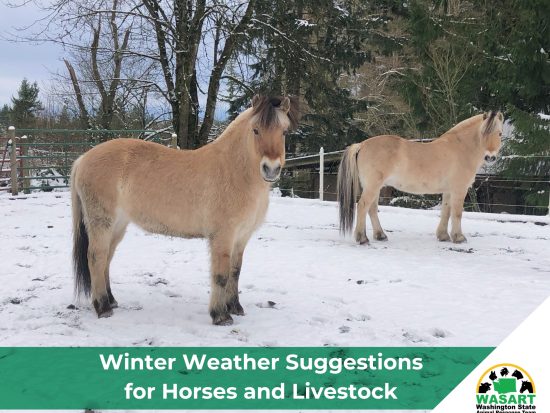
Protecting animals from the cold, wind, and rain can prevent hypothermia, and other weather-related issues.
Shelter
- Access to windbreaks and shelter will minimize cold stress. If animal is kept inside, ensure good air exchange while avoiding drafts for respiratory health.
- Use bedding materials to provide insulation against the cold and absorb moisture effectively.
- Pastured animals don’t need a blanket if they have a good winter hair coat, are healthy, and have adequate shelter.
Water
- Ensure easy access to clean and unfrozen water for proper hydration, body condition maintenance, and avoiding colic. Check daily.
- Water intake will increase as feed intake increases.
- Use heated waterers, insulating water sources, provide warm water or at least break ice at regular intervals.
- Water warmed to around 50 degrees F may increase animals’ water consumption, aid digestion, and prevent low-level dehydration.
- Eating snow chills the body further and is not a suitable substitute for a clean water source.
Feed
- Increase feed/forage to meet energy needs, maintain body temperature and body condition. This may be as high as twice their usual feed consumption.
- Provide free choice salt and minerals.
- Remember eating generates heat.
Other
- Give extra attention to young, elderly, ill and poor body condition animals who may need a higher level of care to handle weather extremes.
- Minimize exercise during extreme cold weather to prevent excessive sweating.
- Check hooves for ice and snow buildup.
- Mitigate slip hazards (for animals and yourself) with sand or wood chips, limit running and playing on hard unforgiving surfaces.
- Frostbite can affect noses, ears and other parts of the body that become wet or damp in freezing temps.
- Consult a veterinarian for specific dietary and healthcare requirements.
